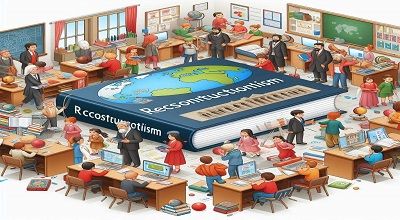Reconstructionism & Curriculum
Now here, Reconstructionism & Curriculum. Reconstructionism is a philosophy of education that emerged as a response to traditional and progressive educational philosophies. It is rooted in the belief that education should not only transmit existing knowledge. Cultural values also play a role in transforming and reconstructing society. Reconstructionist educators view education as a means to address social. And political issues and strive to create a more just and equitable society. When it comes to curriculum in the context of Reconstructionism.
There are several key points to consider:
- Social Relevance: Reconstructionist curriculum is designed to be socially relevant. It seeks to address real-world problems, challenges, and issues. It often focuses on topics such as social justice, environmental sustainability, human rights, and political activism. The curriculum is not limited to traditional subjects but extends to encompass a broad spectrum of knowledge and skills relevant to addressing societal concerns.
- Critical Thinking: Reconstructionist education emphasizes critical thinking and problem-solving. Students are encouraged to question the status quo, analyze social and political issues, and develop the skills necessary to engage in informed and critical discussions and actions.
- Active Citizenship: A primary goal of Reconstructionist education is to prepare students to be active, responsible, and engaged citizens. The curriculum often includes components that encourage students to become involved in their communities. Participate in civic activities, and advocate for social change.
Extra here…
- Multicultural and Interdisciplinary: Reconstructionist curriculum often incorporates a multicultural perspective and is interdisciplinary in nature. It aims to provide a holistic understanding of social issues by drawing from various disciplines and perspectives. This helps students appreciate the complexity of societal problems and potential solutions.
- Human Values and Ethics: Reconstructionist education emphasizes the development of human values and ethics. It encourages students to consider the moral and ethical dimensions of societal issues and to make decisions based on principles of justice and equity.
- Action-Oriented: Reconstructionism places a strong emphasis on taking action. Students are encouraged not just to discuss or analyze problems but to actively work towards solutions. This may involve community service, advocacy, or other forms of engagement.
Summary
It’s important to note that Reconstructionism is not a widely adopted educational philosophy. And its implementation can vary significantly depending on the educators and institutions that embrace it. While some educators may fully align with its principles.
Others may incorporate elements of Reconstructionism into their teaching. While also drawing from other educational philosophies to create a balanced curriculum. Reconstructionism is often seen as a more radical and activist approach to education. Its impact on the curriculum can be particularly pronounced in schools and programs that subscribe to its principles.
